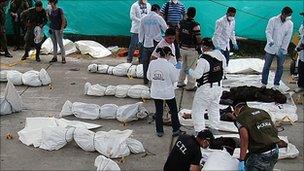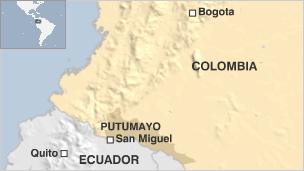Senior Farc rebel leader 'killed' in Colombia
- Published

The government says it is the biggest blow to the Farc in recent years
The Colombian armed forces say they have killed a senior commander of the Farc rebel group.
They said the guerrilla leader Sixto Cabana was among 27 rebels killed in an attack on a camp near the Ecuadorean border on Sunday.
Mr Cabana, 55, was wanted in the US for alleged cocaine trafficking and was on the Farc's ruling general staff.
The US had offered a reward of $2.5m (£1.6m) for information leading to his arrest.
The Colombian Defence Minister, Rodrigo Rivera, said it was the most grievous blow to the left-wing rebel group in recent years.
The fighting in the Putumayo region happened near the town of San Miguel, where eight policemen died in a rebel ambush earlier this month.
Police commandos were dropped by helicopter after air force planes bombed a rebel camp in the jungle.
Cocaine mastermind
The police said one of the dead rebels had been identified as Sixto Cabana, alias "Domingo Biojo," the commander of the 48th front of the Revolutionary Armed Forces of Colombia (Farc).
They said he had been a member of the rebel group for 25 years and was involved in failed peace negotiations with the government a decade ago.
The US state department says Mr Cabana "controlled the production and export of hundreds of tons of cocaine to the US and the world".
He was also "responsible for the murder of hundreds of people who violated or interfered with the Farc's cocaine policies," the State Department website said.

On Sunday Colombian president Juan Manuel Santos said the operation in Putumayo was a sign of how he would respond to the Farc's war strategy.
Farc rebels have stepped up their violent campaign since Mr Santos took office on 7 August.
Although the rebels have said they are prepared to enter peace talks, more than 40 security personnel have been killed so far this month in a series of attacks and ambushes.
Analysts say the raids may be intended to force the government to negotiate.
But Mr Santos has said he will not negotiate with the guerrillas until they release all their hostages and stop attacks.
During his election campaign he promised to continue the tough security policies of his predecessor, Alvaro Uribe, who left office with high approval ratings after years of hard-line policies against the rebels.
- Published20 September 2010
- Published11 September 2010
- Published1 August 2010